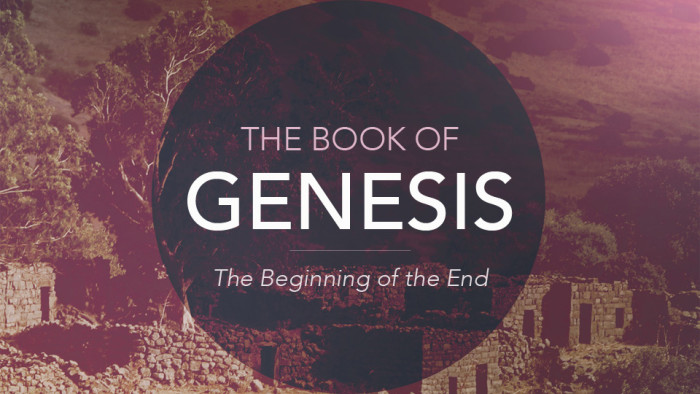“Found it a more awfully solemn thing than I had imagined to [preach] Christ authoritatively; yet a glorious privilege!” – Robert Murray M’Cheyne
A Book of the Year Contender?
I don’t remember where or when I first heard that Mark Jones was working on a book about the beauty and glory of Christ. Yet, wherever or whenever that was I do remember thinking, “Definite ‘Book of the Year’ contender.”
A Strong Track of Superlative Works
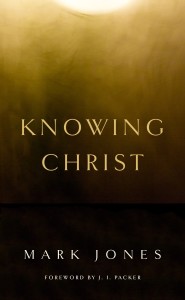 It’s been a fantastic few years of publishing for the Canadian pastor. In the summer of 2012 he published A Christian’s Pocket Guide to Jesus Christ: An Introduction to Christology, which I believed is one of the most helpful little volumes on Christ you could ever put in the hands of a lay member. Later that year Jones teamed up with Joel Beeke in A Puritan Theology: Doctrine for Life, a beautiful behemoth of Puritan teaching on all manner of subjects. His 2013 book Antinomianism: Reformed Theology’s Unwelcome Guest? astutely applied historical and pastoral theology to an old poison that seemed to be creeping into popular evangelicalism.
It’s been a fantastic few years of publishing for the Canadian pastor. In the summer of 2012 he published A Christian’s Pocket Guide to Jesus Christ: An Introduction to Christology, which I believed is one of the most helpful little volumes on Christ you could ever put in the hands of a lay member. Later that year Jones teamed up with Joel Beeke in A Puritan Theology: Doctrine for Life, a beautiful behemoth of Puritan teaching on all manner of subjects. His 2013 book Antinomianism: Reformed Theology’s Unwelcome Guest? astutely applied historical and pastoral theology to an old poison that seemed to be creeping into popular evangelicalism.
Aside from some periodic goofiness on Reformation 21 (for example), Jones has been a blaze of magnificent productivity.
Time to Stare at the Son
His latest book, Knowing Christ, is scheduled to land on September 28th and is a welcome return to the favorite topic of Christology. If Jones’ recent publishing history is worth anything, we can be sure this book will surely find its way on the numerous “Best of the Year” lists come November and December. Here’s what the venerable Dr. Packer has to say in his foreword:
The Puritans loved the Bible, and dug into it in depth. Also, they loved the Lord Jesus, who is of course the Bible’s focal figure; they circled round him, centred on him, studied minutely all that Scripture had to say about him, and constantly, conscientiously, exalted him in their preaching, praises, and prayers. Mark Jones, an established expert on many aspects of Puritan thought, also loves the Bible and its Christ, and the Puritans as expositors of both; and out of this triune love he has written a memorable unpacking of the truth about the Saviour according to the classic Reformed tradition, and the Puritans supremely. Knowing Christ is a book calculated to enrich our twenty-first-century souls, and one that it is an honour to introduce.
The Banner of Truth’s run of greatness appears alive as ever.
Testing and Trusting
Since Genesis 12 the life of Abraham has occupied our study and we get one final—and powerful—look at him tonight. Abraham, we must remember, was a godless idolater God sovereignly and graciously chose, called, and covenanted with to make his family great and bless all the nations. So uniquely blessed by and related to God was he that Scripture calls him, “the friend of God.” What we see tonight in 22:1-25:18 is an answer to the question, “How does God treat His friends?” The answer may surprise many of you, but I hope it comforts all of us as we leave the story of this great patriarch.
God Provides a Substitute
As best I can tell, it’s likely that some 10-12 years have passed between the close of chapter 21 and the opening of chapter 22. It was a long period of peace, but now Abraham is made to experience one final storm of pain—undoubtedly the greatest of his life—as God gives him a final command. Look again at 21:2, “He said, ‘Take your son, your only son Isaac, whom you love, and go to the land of Moriah, and offer him there as a burnt offering on one of the mountains of which I shall tell you.’” I’m not sure it’s possible for us to imagine the grief that must have flooded Abraham’s soul at this moment. Here is the child of promise, the son from Sarah Abraham waited twenty-five years for, and now God commands him to offer up Isaac as a burnt offering. Lest we miss how horrifying the act would have been, we must know that the Old Testament tells us burnt offerings entailed cutting up the sacrifice into pieces before burning it. It’s a terrifying command isn’t it?
20:3 tells us Abraham “rose early in the morning” taking Isaac and a servant and “went to the place of which God had told him.” Three days go by and I wonder if Abraham was able to sleep at all. Surely like King Darius tossed and turned as Daniel spent the night in the lion’s den, Abraham must have had precious little sleep, as Isaac was about to go to his death. Yet, it’s entirely possible that Abraham slept just fine for look at what Abraham tells his servant in 22:5, “Stay here with the donkey; I and the boy will go over there and worship and come again to you.” Abraham says, “We will worship God and be right back.” Apart from the Lord Jesus, is there any greater example of faith in the Bible? Hebrews 11, which we read earlier tonight, says that Abraham’s faith was in God’s power to raise Isaac from the dead. Up the mountain they go and Abraham is planning on sacrificing His son only to find God raise him from the dead. What courageous faith! We see here that courageous faith is taking God at His word and trusting in His power to save. To live with courage for God means living by faith in His word and power. If you’re a Christian, do you find with each passing year your courage in God’s word and from God’s power increasing? I hope we as a church can say with each passing year the courage of faith is growing in our midst.
Abraham puts the wood on Isaac’s shoulder, takes “in his hand the fire and the knife,” and up the mountain they go. However old Isaac is he’s old enough to know something is missing and so he asks, “Where is the lamb for a burnt offering?” Oh, what anguish Abraham must have felt at his son’s innocent ignorance. Yet, see again Abraham’s courageous faith as he answers in 20:8, “God will provide for himself the lamb for a burnt offering, my son.”
They eventually arrive at the place where God told them, Abraham builds an altar, binds Isaac, and lays him “on top of the wood.” Scholars have long wondered how Abraham, a very old man, was able to get young Isaac to acquiesce to the laying on the altar. Some have said that Abraham must have knocked him out some how, either with a blow or a primitive drug. But I think the answer is much simpler: Isaac trusted his father. Oh, how I’ve prayed this week for my sons to have similar trust in me.
Look at 22:10-12 to see what happened next, “Then Abraham reached out his hand and took the knife to slaughter his son. But the angel of the Lord called to him from heaven and said, ‘Abraham, Abraham!’ And he said, ‘Here I am.’ He said, ‘Do not lay your hand on the boy or do anything to him, for now I know that you fear God, seeing you have not withheld your son, your only son, from me.’” Why did God test Abraham? To see if he feared God enough to obey a most difficult word. We see here there is a direct link between how one’s fear of God and one’s obedience to God. Fear of God fuels obedience to God and obedience to God reveals fear of God. This is a truth on which you might meditate and examine yourself this week. I think we also see here that God can be trusted even when His word is hard to understand.
Abraham lifts up his eyes and sees a ram caught “in a thicket by his horns,” and he proceeds to sacrifice the ram in place of Isaac. God provided a substitute. Look at how Abraham magnifies God’s provision in 22:14, “Abraham called the name of that place, ‘The Lord will provide’; as it is said to this day, “On the mount of the Lord it shall be provided.”
Our God is the Lord of provision. You’ll notice if you scan your eyes through 22:15-19 that the angel of the LORD speaks again from heaven, saying, “God has sworn by himself to bring about the promises He made to you because you obeyed His voice.” This is the first and only time in Scripture that God swears by His own name. The event on Mt. Moriah is thus of no common place in God’s word.
whenever I work on a sermon I listen to a war movie soundtrack. I do it because I believe preaching is one of the greatest battlefields in spiritual warfare and so listening to battle anthems puts my soul in the most appropriate place. One of my favorite soundtracks ends with a requiem for soldiers in the Pacific theater of World War II. It moves me every time I listen for it thrillingly captures the tragedies and triumphs of men who’ve gone before.
You’ll notice that 25:7-8 tells us, “These are the days of the years of Abraham’s life, 175 years. Abraham breathed his last and died in a good old age, an old man and full of years, and was gathered to his people.” When I read that I hear a soundtrack like requiem run through my mind, highlighting the triumphs and tragedies of Abraham’s life. And so as we begin to close I want to do so by thinking about the two main themes of Abraham’s life, themes that stretch even to us today.
Themes from Abraham’s Life
Testing from God. 22:1 says it so plainly, “God tested Abraham.” God tested Abraham’s love for wealth when he called him to leave his home in chapter 12. God tested Abraham’s love for safety when he journey to Egypt and Gerar, where he sacrificed Sarah’s integrity for His own safety. God tested Abraham’s love for his family by commanding him to sacrifice Isaac. All in all, God tested Abraham’s obedience by asking him to surrender everything. We dare not think God never tests His people today. How many times throughout a given week do we encounter a spiritual struggle and, if we think long enough, we might just see it as a test from God. Might he be testing your fear of Him to see if you will surrender your love for a particular sin? Surrender an idolatrous relationship? Surrender worldly protection and cling to His promises alone? What rivalries might be holding you back to whole-hearted devotion to God?
Trusting in God. Oh, how Abraham trusted in God! Like the old hymn, Abraham with great faith trusted God and “proved him o’er and o’er.” I pray God would graciously form us in to a church that that is wonderfully peculiar in how deep we trust God and take Him at His word.
But let us land where we must—how often we fail to trust in God! We put our own “Isaacs” ahead of God thinking they will give me more security and worth than He will. It might be better said of us, “how we’ve failed Him o’er and o’er.” Yet, there is hope for us this night. For like Isaac, Jesus carried would on His back up a mountain where His Father sacrificed Him for us all. God said to Abraham, “Now I know you love me, because you did not withhold your son, your only son whom you love from me.” Now we can say to God, “Now we know that You love us, because you did not withhold your son, your only son whom you love, from us.”
He has provided a way for us all. Our God is the Lord of provision.
This post is adapted from my recent sermon, “Abraham & Isaac,” on Genesis 22-25.
Know It to Wield It
“For the Gospel the Bible must be used. The minister must so live in it that he wears it easily. One reason why people are repelled from it is that the preachers cannot carry it with easy mastery. They are in Goliath’s armour. Now the ideal ministry must be a Bibliocracy. It must know its Bible better than any other book.” – P.T. Forsyth, Positive Preaching and the Modern Mind, 37.
Recent Reads
I love to read. I find it helpful to summarize my thoughts on each book and I offer those thoughts in the hope that you will be encouraged to either read or pass over the given title.
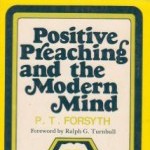 Positive Preaching and the Modern Mind by P.T. Forsyth. A few months ago I noticed a trend in several of the preaching books I’d read: some of the best parts of each book were nothing more than quotations from Forsyth’s Positive Preaching and the Modern Mind. “Ad fontes!” I cried and so here we are. Forsyth’s opus on preaching was originally delivered as part of the Lyman Beecher Lectures on Preaching at Yale University in 1907. The Scottish theologian barrels out of the gate saying, “It is, perhaps, an overbold beginning, but I will venture to say that with its preaching Christianity stands or falls” (3). “You sir,” I say, “are worth listening to.” Forsyth wanders around more than I’d prefer, but he often finds himself in a place of brilliance. His thoughts on preaching and “Religious Reality” are particularly smashing. This isn’t a fast read, but you’re preaching will be helped.
Positive Preaching and the Modern Mind by P.T. Forsyth. A few months ago I noticed a trend in several of the preaching books I’d read: some of the best parts of each book were nothing more than quotations from Forsyth’s Positive Preaching and the Modern Mind. “Ad fontes!” I cried and so here we are. Forsyth’s opus on preaching was originally delivered as part of the Lyman Beecher Lectures on Preaching at Yale University in 1907. The Scottish theologian barrels out of the gate saying, “It is, perhaps, an overbold beginning, but I will venture to say that with its preaching Christianity stands or falls” (3). “You sir,” I say, “are worth listening to.” Forsyth wanders around more than I’d prefer, but he often finds himself in a place of brilliance. His thoughts on preaching and “Religious Reality” are particularly smashing. This isn’t a fast read, but you’re preaching will be helped.
 The Soul of Prayer by P.T. Forsyth. I liked Positive Preaching enough to pick up Forsyth’s much shorter (95 pages) work on prayer. The book is straightforward enough as it consider seven attributes of prayer: Prayer’s inwardness, naturalness, moral reactions, timeliness, ceaselessness, vicariousness, and insistency. He rambles about again without a cohesive center, but—like Positive Preaching—the rambling proves to offer continual spiritual profit. I found myself freshly challenged to prayer through an old man illuminating old truths in fresh ways.
The Soul of Prayer by P.T. Forsyth. I liked Positive Preaching enough to pick up Forsyth’s much shorter (95 pages) work on prayer. The book is straightforward enough as it consider seven attributes of prayer: Prayer’s inwardness, naturalness, moral reactions, timeliness, ceaselessness, vicariousness, and insistency. He rambles about again without a cohesive center, but—like Positive Preaching—the rambling proves to offer continual spiritual profit. I found myself freshly challenged to prayer through an old man illuminating old truths in fresh ways.
 Constrained by His Love: A New Biography of Robert Murray M’Cheyne by J.L. Van Valen. Originally published in Dutch in 1992, Christian Focus translated Van Valen’s work and made it the most recent major English-language bio of M’Cheyne in 2002. The work reads less like a chronological narrative and more like a systematic treatment of M’Cheyne’s thought/practice. Once I got around that—and what seemed to be some literary verve lost in translation—I found my soul edified. Frankly, it seems impossible to me for anyone to write anything about M’Cheyne and not edify the reader. The Scotsman is just that compelling. Pictures of M’Cheyne’s cultural context, personal letters, and major figures help illuminate the story at every turn. Van Valen’s final chapter of summary thoughts on the man’s life and legacy is worth the price of the book.
Constrained by His Love: A New Biography of Robert Murray M’Cheyne by J.L. Van Valen. Originally published in Dutch in 1992, Christian Focus translated Van Valen’s work and made it the most recent major English-language bio of M’Cheyne in 2002. The work reads less like a chronological narrative and more like a systematic treatment of M’Cheyne’s thought/practice. Once I got around that—and what seemed to be some literary verve lost in translation—I found my soul edified. Frankly, it seems impossible to me for anyone to write anything about M’Cheyne and not edify the reader. The Scotsman is just that compelling. Pictures of M’Cheyne’s cultural context, personal letters, and major figures help illuminate the story at every turn. Van Valen’s final chapter of summary thoughts on the man’s life and legacy is worth the price of the book.
 Uneasy in Babylon: Southern Baptist Conservatives and American Culture by Barry Hankins. I picked up Hankins book as something of a personal treat after completing my spring seminars at The Institution back in early June. Hankins book attempts to answer the question, “How did the conservative leaders of America’s largest Protestant denomination come to hold culture views that put them at odds with the moderates who had preceded them in the leadership positions of their denomination?” His short answer is, “Conservative leaders came to believe that America, including the South, was in the throes of a cultural crisis that necessitated a warlike struggle against the forces that were hostile to evangelical faith.” Sounds fun, doesn’t it? I thought so. As a conservative Southern Baptist I predictably disagree with some of Hankins’ more moderate conclusions, but on the whole this is some mighty fine denominational history.
Uneasy in Babylon: Southern Baptist Conservatives and American Culture by Barry Hankins. I picked up Hankins book as something of a personal treat after completing my spring seminars at The Institution back in early June. Hankins book attempts to answer the question, “How did the conservative leaders of America’s largest Protestant denomination come to hold culture views that put them at odds with the moderates who had preceded them in the leadership positions of their denomination?” His short answer is, “Conservative leaders came to believe that America, including the South, was in the throes of a cultural crisis that necessitated a warlike struggle against the forces that were hostile to evangelical faith.” Sounds fun, doesn’t it? I thought so. As a conservative Southern Baptist I predictably disagree with some of Hankins’ more moderate conclusions, but on the whole this is some mighty fine denominational history.
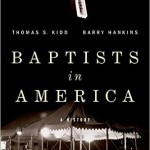 Baptists in America: A History by Thomas Kidd and Barry Hankins. The month of Baptist history continued with Hankins joining forces with the redoubtable Tommy Kidd. They ably tell the fascinating story of Baptists rise from persecuted minority to the Protestant majority in our country. Their research is impeccable and immense, best seen in the very personal vignettes woven into each chapter regarding forgotten individuals. I did, however, find this literary approach giving the story some narrative slack. But these brothers can be forgiven. The chapters on “Slavery, Schism, and War” and “Black Baptist in Babylon” were particularly insightful. At the end of the book the authors write, “In all of this, Baptists are notorious for two things—evangelism and schism.” Sounds about right to me. Well done!
Baptists in America: A History by Thomas Kidd and Barry Hankins. The month of Baptist history continued with Hankins joining forces with the redoubtable Tommy Kidd. They ably tell the fascinating story of Baptists rise from persecuted minority to the Protestant majority in our country. Their research is impeccable and immense, best seen in the very personal vignettes woven into each chapter regarding forgotten individuals. I did, however, find this literary approach giving the story some narrative slack. But these brothers can be forgiven. The chapters on “Slavery, Schism, and War” and “Black Baptist in Babylon” were particularly insightful. At the end of the book the authors write, “In all of this, Baptists are notorious for two things—evangelism and schism.” Sounds about right to me. Well done!
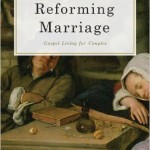 Reforming Marriage by Doug Wilson. I know some think of Wilson as the dark lord of Reformed theology, particularly all you “TR” (Truly Reformed ©) brothers. But I love him. Not that I agree with everything he says, far from it. But, Wilson always makes you think and he writes with skill that’s, as the kids say, “stupid good.” I’ve long considered his Future Men as my manual for raising boys, so I decided to dip into the rest of the Family Series catalog. First up was his little treatise on marriage. And let me say what many don’t want to say, this is brilliant. I thought his chapter one honoring the marriage bed is as good as anything I’ve yet read on the topic. This is biblical conviction worth listening to.
Reforming Marriage by Doug Wilson. I know some think of Wilson as the dark lord of Reformed theology, particularly all you “TR” (Truly Reformed ©) brothers. But I love him. Not that I agree with everything he says, far from it. But, Wilson always makes you think and he writes with skill that’s, as the kids say, “stupid good.” I’ve long considered his Future Men as my manual for raising boys, so I decided to dip into the rest of the Family Series catalog. First up was his little treatise on marriage. And let me say what many don’t want to say, this is brilliant. I thought his chapter one honoring the marriage bed is as good as anything I’ve yet read on the topic. This is biblical conviction worth listening to.
 Fidelity: How to Be a One-Woman Man by Doug Wilson. Wilson ups the ante in Fidelity by saying, “Some of what is said here may be offensive to some Christian women, but the point is certainly not to give offense. The point is to provide biblically specific and pointed help for Christian males” (13). “Help on what?” you might ask. The answer is, of course, being a one-woman man grounded in God’s word (1 Tim. 3:2). So, while the book is certainly not for all people, it does have many helpful things to say about “the various allurements which distract Christian men from their sexual responsibilities.” While I didn’t find every chapter useful, his work on “Lust and Pornography” and their incumbent perils is oh so helpful.
Fidelity: How to Be a One-Woman Man by Doug Wilson. Wilson ups the ante in Fidelity by saying, “Some of what is said here may be offensive to some Christian women, but the point is certainly not to give offense. The point is to provide biblically specific and pointed help for Christian males” (13). “Help on what?” you might ask. The answer is, of course, being a one-woman man grounded in God’s word (1 Tim. 3:2). So, while the book is certainly not for all people, it does have many helpful things to say about “the various allurements which distract Christian men from their sexual responsibilities.” While I didn’t find every chapter useful, his work on “Lust and Pornography” and their incumbent perils is oh so helpful.
 How to Exasperate Your Wife and Other Short Essays for Men by Doug Wilson. The cover and title are quite hilarious, but they belie a serious little book. After Reforming Marriage and Fidelity I wondered if Wilson’s latest was going to be something of a “Doug’s Best Hits on Husbandry” album. So I was pleasantly surprised to find him treading on familiar ground in a fresh way. Every chapter is short, packed with pithy little punches and delightful spiritual digs at much of the masculine bufoonery plaguing Christian men today. I’ve already invited a few men to read the book with me as I think it will be quite edifying for all as we desire to represent Christ in our homes.
How to Exasperate Your Wife and Other Short Essays for Men by Doug Wilson. The cover and title are quite hilarious, but they belie a serious little book. After Reforming Marriage and Fidelity I wondered if Wilson’s latest was going to be something of a “Doug’s Best Hits on Husbandry” album. So I was pleasantly surprised to find him treading on familiar ground in a fresh way. Every chapter is short, packed with pithy little punches and delightful spiritual digs at much of the masculine bufoonery plaguing Christian men today. I’ve already invited a few men to read the book with me as I think it will be quite edifying for all as we desire to represent Christ in our homes.
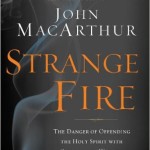 Strange Fire: The Danger of Offending the Holy Spirit with Counterfeit Worship by John Macarthur. Every Tuesday morning at 7:30am I meet with the other two staff members of IDC and we’re always working through a book. I can’t remember how it came up, but one of them suggested we read Macarthur’s Strange Fire. And read we did. And that particular staff member still isn’t sure if his decision was a good one. He thought Macarthur’s arguments were compelling biblically, but failed the “winsomeness test.” I’m not sure if I agree with the latter issue, but I can see how Macarthur’s utter confidence in his interpretation of God’s word can come across as arrogance to some. I still believe anyone looking for a popular, evangelical case for cessationism would do well to read and wrestle with this book.
Strange Fire: The Danger of Offending the Holy Spirit with Counterfeit Worship by John Macarthur. Every Tuesday morning at 7:30am I meet with the other two staff members of IDC and we’re always working through a book. I can’t remember how it came up, but one of them suggested we read Macarthur’s Strange Fire. And read we did. And that particular staff member still isn’t sure if his decision was a good one. He thought Macarthur’s arguments were compelling biblically, but failed the “winsomeness test.” I’m not sure if I agree with the latter issue, but I can see how Macarthur’s utter confidence in his interpretation of God’s word can come across as arrogance to some. I still believe anyone looking for a popular, evangelical case for cessationism would do well to read and wrestle with this book.
 The Hobbit by J.R.R. Tolkien. One day while running—any good thought I have usually comes while on a run—I decided I’d been away from Middle Earth for far too long. I soon realized it’s because I last ventured into the original, literary world of Tolkien about thirteen years (!) ago. That’s terribly long for a Hobbit loving soul like mine. So back to the world of hobbits, dwarves, elves, wizards, rings, and bad guys I went. I’d forgotten how much singing there was in middle earth and actually managed to lose a few characters over the years (Beorn being the most notable). After the book finished you know what first popped into my mind? “My, my how Peter Jackson bungled the whole Hobbit franchise.”
The Hobbit by J.R.R. Tolkien. One day while running—any good thought I have usually comes while on a run—I decided I’d been away from Middle Earth for far too long. I soon realized it’s because I last ventured into the original, literary world of Tolkien about thirteen years (!) ago. That’s terribly long for a Hobbit loving soul like mine. So back to the world of hobbits, dwarves, elves, wizards, rings, and bad guys I went. I’d forgotten how much singing there was in middle earth and actually managed to lose a few characters over the years (Beorn being the most notable). After the book finished you know what first popped into my mind? “My, my how Peter Jackson bungled the whole Hobbit franchise.”
 The Fellowship of the Ring by J.R.R Tolkien. Peter Jackson’s version of The Hobbit again managed to weave it’s way into my mind as I read the next book in the series. I was surprised to find how many little asides—Radagast anyone?—in the cinematic Hobbit actually came from The Fellowship of the Ring book. The Fellowship’s glory and beauty remain unstained, I am pleased to report. Tolkien’s longer introduction to the history of hobbits in this volume caused me to realize something for the first time: my natural disposition is strikingly hobbit-like. Let those who know me best and love “the trilogy to rule all trilogies” understand.
The Fellowship of the Ring by J.R.R Tolkien. Peter Jackson’s version of The Hobbit again managed to weave it’s way into my mind as I read the next book in the series. I was surprised to find how many little asides—Radagast anyone?—in the cinematic Hobbit actually came from The Fellowship of the Ring book. The Fellowship’s glory and beauty remain unstained, I am pleased to report. Tolkien’s longer introduction to the history of hobbits in this volume caused me to realize something for the first time: my natural disposition is strikingly hobbit-like. Let those who know me best and love “the trilogy to rule all trilogies” understand.
Click here to find other entries in the Recent Reads series.
Experiencing Life in Worship
I long to lead a church alive to the glory of God in Jesus Christ. Thus, I must think biblically and carefully about the ways in which life comes to God’s people. If God’s word doesn’t guide the way I will be lost in the weeds of worldly wisdom. This is a ministry matter where pragmatism must be banished like the mosquitos currently haunting my front yard.
When pragmatism bites you just want to scratch it all the more.
What to Call Our Worship
We live in a time where many an evangelical church prefers to speak about their worship gathering as a worship “experience.” Now, I’m fine with the etymological import of “experience” in gathered worship. I do believe gathered worship should be “an event which has affected one” with the God who reigns over all. The great apostle himself speaks about longing to come to Corinth so the church would have a “second experience of grace” (2 Cor. 1:15). We must experience grace by being made alive to grace. If we pastors don’t pray with a Jacobian wrestling spirit for our congregations to have an experiential encounter with the Triune God each week . . . well, that sound you hear just may be Spirit calling you to repent, or calling for your pastoral credentials. Living churches are those consistently experiencing the power and pleasure of life in Christ.
Thus, I am all for experience! You hear what’s coming, right? The often-necessary conjunction must now make its appearance.
A Devilish Deception
But I must confess that something nags my soul about evangelicalism’s employment of “experience.” It’s not that many a church prefers the noun, but how many a church tries to bring it to fruition. In other words, the question for pastors is not, “Should I call my church’s gathered worship an experience, but, “How do I lead my church to experience the Risen Christ each week?” The more I read, watch, and participate in worship “experiences” the more I’m convinced that we are in danger of latching onto a fiendish lie, which says, “Experiencing the glory of God comes through performance and personality.”
I’m not saying most pastors or churches would say it with those words; that’s the fiendish nature of it all. Yet, actions reveal the heart. Walk into your average thriving church today and tell me you don’t see performance and personality saturating the service. Big bands, big sets, and big sounds provide the orchestral backdrop for the worship of God’s people. The preacher ascends to the sacred desk and what confronts the congregation is not first a man of reverential holiness, but one with the look of chic and the sound of cool. From his lips pours forth more language of this world than the Other World. Squeeze out the many churches’ philosophical pursuit of experience and what you get is performance and personality.
Now, I hear the accusation rising, “Stone, you are just making generalizations. You can do better.” Yes, I am and I could, but I still think it’s ok. As I’ve often heard Doug Wilson say, “Jesus was a generalizer.” He loved to lump all the Pharisees together in pronouncing woe upon their soul, yet not every Pharisee was a hypocrite. Some Pharisees repented and trusted in Christ. Generalizations then help further particular points.
And the point of great concern I have is that by pursuing (however consciously or unconsciously) performance and personality we’ve actually fallen into a pit. We’re trying to fuel Christian experience with little more than spiritual sriracha powder—we burn for a bit and then everything returns to normal. And what we don’t realize is that the burn leaves a callous and so we simply need more and more heat in order to ever feel the experience again.
Brothers, there must be a better way.
A Better—More Biblical?—Way
We thus come back to the initial concern, what does God’s word tell us should bring life to God’s people? Well, quite simply, “God’s word.” With undeniable clarity the Bible says the Bible gives life.
- “My soul clings to the dust; give me life according to your word!” (Ps. 119:25)
- “Turn my eyes from looking at worthless things; and give me life in your ways.” (Ps. 119:37)
- “This is my comfort in my affliction, that your promise gives me life.” (Ps. 119:50)
- “I will never forget your precepts, for by them you have given me life.” (Ps. 119:93)
- “I am severely afflicted; give me life, O Lord, according to your word!” (Ps. 119:107)
- “Plead my cause and redeem me; give me life according to your promise!” (Ps. 119:154)
- “Great is your mercy, O Lord; give me life according to your rules.” (Ps. 119:156)
So, life comes through God’s word. The written word is all about The Incarnate Word, who is—say it with me now, “The way, the truth, and the life.” This Lord of Life sent His Life-Giving Spirit to bring life through the written word, which communicates life. The same Word that created life from dead bones in Ezekiel 37 is still in the bone rattling business. May the bones of your congregation shake with life this weekend.
I trust I need not tarry longer here. And all God’s people said, “Amen.”
A Proposal
Here then is my proposal for a way out of the performance and personality pit: permeate your worship gathering with an experience of God through His word. Let your people be washed with the water of the word. Let visitors be amazed at how loudly and frequently God’s speaks in the service. Let the Spirit do His ordinary work of exalting the Extraordinary Christ through God’s word.
If you’re looking for an idea of what this might look like I offer up my church’s liturgy not as a perfect example, but an example nonetheless:
- We begin with a “call to worship.” God gets the first word. He is the Alpha.
- After the first song we have a confession of sin and prayer of praise. This prayer is usually little more than a stream of inspired verses or a psalm.
- We sing two more songs, chosen in part for their very Scripturalness. Any time there is any sort of instrumental during a song God’s word will usually be on the screen. For example, this Saturday we hope to sing Boswell and Bleeker’s “In My Place.” During the intro, before we sing, “In my place He stood condemned / He who knew no sin,” 2 Corinthians 5:21 will be on the screen: “For our sake he made him to be sin who knew no sin, so that in him we might become the righteousness of God.”
- After our third song a church member stands to read a passage of Scripture that complements the sermon text. This week we hope to read Hebrews 11:17-19 since we are studying Abraham’s willingness to sacrifice Isaac in Genesis 21.
- I will lead in a 5-7 minute pastoral prayer. I spend time beforehand writing down any relevant Bible verses for each petition. We try to pray the word in addition to singing it and reading it.
- We have another song while the offering (which we like to speak of as “supporting the word”) goes around.
- Next comes the sermon and song of response after our study of God’s word.
- We then take the Lord’s Supper, God’s visible word to us. I lead into the self-examination time by reading a particular passage of Scripture, usually one that stems from the text we just studied.
- We end with a benediction from Scripture. God gets the last word. He is the Omega.
Quite literally, there are hundreds of different ways you can saturate your service with Scripture. However you do it, my plea is that of Nike, “Just do it.”
Related Reading: A Better Way: Rediscovering the Drama of God-Centered Worship by Michael Horton, Reverberation: How God’s Word Brings Light, Freedom, and Action to God’s People by Jonathan Leeman.
Praying for Pouring
“We may preach publicly, and from house to house; we may teach the young and warn the old, but all will be in vain. Until the Spirit be poured upon us from on high, briers and thorns shall grow. Our vineyard shall be like the garden of the sluggard. We need that Christ should awake; that He should make bare His arm as in the days of old; that He should shed down the Spirit abundantly.” – Robert Murray M’Cheyne
The Spirituality of Vineyard Music
I’ve long had a fascination with music in the church. The churches of my youth were ones where songs were sung with gusto and joy. I sung in the church choir during my middle school years, led songs for countless church services, and played guitar for countless more.
A Personal Journey
 For almost two decades I’ve been attracted to conversations about and convictions on church music. God’s word has much to tell us about singing in the life of the church. Those who know me best probably weren’t surprised when we planted IDC with a desire to be “A Singing Church.” God creates and commands a singing people. And so we want to sing with loving obedience. Such a belief has great bearing on the songs we thus sing in response to God. Simply put: we are in a sad state when “that which is popular” has more power than “that which is biblically best” in deciding which songs our congregations sing.
For almost two decades I’ve been attracted to conversations about and convictions on church music. God’s word has much to tell us about singing in the life of the church. Those who know me best probably weren’t surprised when we planted IDC with a desire to be “A Singing Church.” God creates and commands a singing people. And so we want to sing with loving obedience. Such a belief has great bearing on the songs we thus sing in response to God. Simply put: we are in a sad state when “that which is popular” has more power than “that which is biblically best” in deciding which songs our congregations sing.
I could continue, but I must really get off the soapbox and arrive at my point.
Over the last few years I’ve found myself increasingly interested in the history of corporate song, particularly in American evangelicalism. So it was with great delight that I wrote a research paper on the spirituality of The Vineyard movement’s top fifty songs for a recent PhD seminar on “20th Century Spirituality.”
Oh, how interesting and illuminating it was!
Understanding the Vineyard
If you don’t know anything about the Vineyard it was the most influential “Third Wave” movement from the mid-1980s to turn of the 21st century. Led by the rock-star-turned-charismatic-mega-church-practitioner John Wimber, the Vineyard emphasized a spirituality of “kingdom power.” Think “signs and wonders” revealed through power healing, power evangelism, and power warfare.
If evangelism, healing, and warfare were the primary means by which Vineyard churches demonstrated the power of Christ’s kingdom, then musical worship is the main vehicle by which they experienced the love of Christ’s kingdom. Kevin Springer, a key figure in the Vineyard during its peak Wimber years, said, “You don’t understand the Vineyard if you don’t understand the worship music.”
I took up Springer’s challenge and wrote a (long) paper in order to understand not just Vineyard music, but what that music emphasized about spirituality.
Spirituality in the Top 50 Vineyard Songs
I worked with CCLI to identify the fifty most-sung Vineyard songs during the John Wimber era. It seemed wise to limit the songs for analysis to the Wimber period for two reasons: 1) the changing landscape of worship music around the turn of the twentieth century makes it difficult to expect any fluidity should one analyze over thirty-five years of Vineyard Music, thus limiting the time period is advantageous, and 2) one cannot truly grasp the Vineyard’s spiritual heartbeat apart from Wimber’s influence, leadership, and teaching.
To give you an idea of what kind of songs we’re working with, here are the top ten:
- “Breathe” (Marie Barnett, © 1995 Mercy / Vineyard Publishing)
- “Draw Me Close” (Kelly Carpenter, © 1994 Mercy / Vineyard Publishing)
- “Take My Life” (Scott Underwood, © 1995 Mercy / Vineyard Publishing)
- “Change My Heart O God” (Eddie Espinosa, © 1982 Mercy / Vineyard Publishing)
- “In the Secret” (Andy Park, © 1995 Mercy / Vineyard Publishing)
- “Every Move I Make” (David Ruis, © 1996 Mercy / Vineyard Publishing)
- “Refiner’s Fire” (Brian Doerksen, © 1990 Mercy / Vineyard Publishing)
- “More Love More Power” (Jude Del Hierro, © 1987 Mercy / Vineyard Publishing)
- “Spirit Song” (John Wimber, © 1979 Mercy / Vineyard Publishing)
- “Holy and Anointed One” (John Barnett, © 1988 Mercy / Vineyard Publishing)
My analysis revealed two core themes to Vineyard spirituality: 1) desperation for God’s presence, and 2) consecration unto holiness. Along the way I try to show what these songs teach us regarding the character of God and the work of His Son. Even the knowledgeable folk may find a few surprising things here.
While there are many things to affirm in the Vineyard’s popular catalogue (devotion to God’s word, using songs as prayers) the Vineyard exported a radical individualism in corporate song. Forty-four of the top fifty songs are written exclusively from the first person singular perspective. The songs are all about “I, me, my, and mine.” Hence why Tanya Luhrmann can say, “The [Vineyard’s] worship is intensely individual, even when everyone sings together” (emphasis added). This radical individualism leads me to the glaring flaw in the Vineyard’s most popular music: it prioritizes God’s immanence to the expense of His transcendence. It’s a spirituality of “lots of love with a little cross.”
I could say more, but you might want to read it for yourself.
Click here to read “Lots of Love with a Little Cross: The Spirituality of Vineyard Music.” Head down to page fourteen if you want to skip over a broad analysis of Vineyard’s history and confessional spirituality.
Stop and Stare
The Pastor as Theologian
In his book Jonathan Edwards and The Ministry of the Word Sweeney says, “In the early twenty-first century, when many pastors have abdicated their responsibilities as theologians, and many theologians do their work in a way that is lost on the people of God, we need to recover Edwards’ model of Christian ministry. Most of the best theologians in the history of the church were parish pastors.”
Look at almost any major theologian in church history and you’ll find a man that likely considered himself a pastor first and theologian second. This is a model we need to recover and, happily, it looks like we are working to recover.
This summer two books on the topic—the first was published in June and the second is due in just over two weeks—hit the shelves and further the conversation. Ordinary pastors will want to work their way through these complementary visions of pastors advancing theological understanding.
The Books
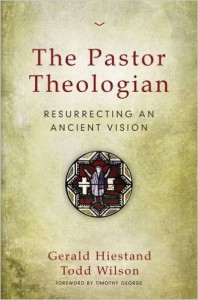 The Pastor Theologian: Resurrecting an Ancient Vision by Gerald Hiestand and Todd Wilson. Pastoral ministry today is often ruled by an emphasis on short-sighted goals, pragmatic results, and shallow thinking. Unfortunately, those in the academy tend to have the opposite problem, failing to connect theological study to the pressing issues facing the church today. Contemporary evangelicalism has lost sight of the inherent connection between pastoral leadership and theology. This results in theologically anemic churches, and ecclesial anemic theologies.
The Pastor Theologian: Resurrecting an Ancient Vision by Gerald Hiestand and Todd Wilson. Pastoral ministry today is often ruled by an emphasis on short-sighted goals, pragmatic results, and shallow thinking. Unfortunately, those in the academy tend to have the opposite problem, failing to connect theological study to the pressing issues facing the church today. Contemporary evangelicalism has lost sight of the inherent connection between pastoral leadership and theology. This results in theologically anemic churches, and ecclesial anemic theologies.
Todd Wilson and Gerald Hiestand contend that among a younger generation of evangelical pastors and theologians, there is a growing appreciation for the native connection between theology and pastoral ministry. At the heart of this recovery of a theological vision for ministry is the re-emergence of the role of the “pastor theologian.”
The Pastor Theologian presents a taxonomy of the pastor-theologian and shows how individual pastors—given their unique calling and gift-set—can best embody this age-old vocation in the 21st century. They present three models that combine theological study and practical ministry to the church:
- The Local Theologian—a pastor theologian who ably services the theological needs of a local congregation.
- The Popular Theologian—a pastor theologian who writes theology to a wider lay audience.
- The Ecclesial Theologian—a pastor theologian who writes theology to other theologians and scholars.
Raising the banner for the pastor as theologian, this book invites the emerging generation of theologians and pastors to reimagine the pastoral vocation along theological lines, and to identify with one of the above models of the pastor theologian.
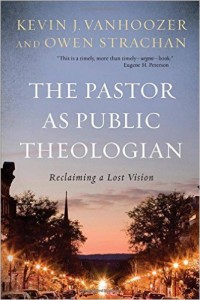 The Pastor as Public Theologian: Reclaiming a Lost Vision by Kevin Vanhoozer and Owen Strachan. Many pastors today see themselves primarily as counselors, leaders, and motivators. Yet this often comes at the expense of the fundamental reality of the pastorate as a theological office. The most important role is to be a theologian mediating God to the people. The church needs pastors who can contextualize the Word of God to help their congregations think theologically about all aspects of their lives, such as work, end-of-life decisions, political involvement, and entertainment.
The Pastor as Public Theologian: Reclaiming a Lost Vision by Kevin Vanhoozer and Owen Strachan. Many pastors today see themselves primarily as counselors, leaders, and motivators. Yet this often comes at the expense of the fundamental reality of the pastorate as a theological office. The most important role is to be a theologian mediating God to the people. The church needs pastors who can contextualize the Word of God to help their congregations think theologically about all aspects of their lives, such as work, end-of-life decisions, political involvement, and entertainment.
Drawing on the depiction of pastors in the Bible, key figures from church history, and Christian theology, this brief and accessible book offers a clarion call for pastors to serve as public theologians in their congregations and communities. The church needs pastors to read the world in light of Scripture and to direct their congregations in ways of wisdom, shalom, and human flourishing. The Pastor as Public Theologian calls for a paradigm shift in the very idea of what a pastor is and does, setting forth a positive alternative picture.
In addition to pastors, this book will be invaluable to seminary students training to be pastors and to their professors. It includes pastoral reflections on the theological task from twelve working pastors.
The Podcasts
I’ve recently listened to a couple podcasts pursuing one, if not both, of the books. Listen in and whet your appetite for your eventual reading.
- The guys over at Christ the Center just last week interviewed Hiestand on “The Pastor Theologian.”
- The Mere Fidelity men interviewed Hiestand and Vanhoozer on their respective visions for restoring a prominent place in today’s church for pastor-theologians.

